The Accountants Guide To Choosing a Third-Party Crypto Tax Tool
Cryptocurrency trading is increasing at an unprecedented level. In 2020, the global crypto market was valued at $1.49 billion with no stop in sight. It’s projected to reach $4.94 billion by 2030. As this market continues to boom, there are more crypto traders now than ever. Since crypto taxes are complex and time-consuming, every single trader will need a crypto tax expert to do their taxes. To save time, accountants shouldn’t use spreadsheets or manual methods. But instead, use a crypto tax tool. In this blog post, you’ll discover how to choose the right crypto tax tool so you can do crypto taxes in an easy, fast, and compliant way.
Why use a crypto tax tool in the first place?
Crypto taxes in particular can be a pain.
There’s little to no guidance on how to complete them accurately.
Laws and regulations are not completely transparent and change year after year.
Having to keep up with changing guidance makes crypto taxes feel like a second job.
If you use a spreadsheet to complete them, they could take days to finish.
But with the right tool, crypto taxes can be just as easy - if not easier - than any other type of tax work.
Because the right crypto tax tool will simplify taxes so that there’s no more going back and forth between a million spreadsheets, screenshots, statements, and emails. You’ll be able to easily sync your client’s trade date and get a complete picture of all their crypto activity. And once their crypto exchanges and wallets are connected, you can import it all to calculate the totals needed for tax purposes. It really is that simple.
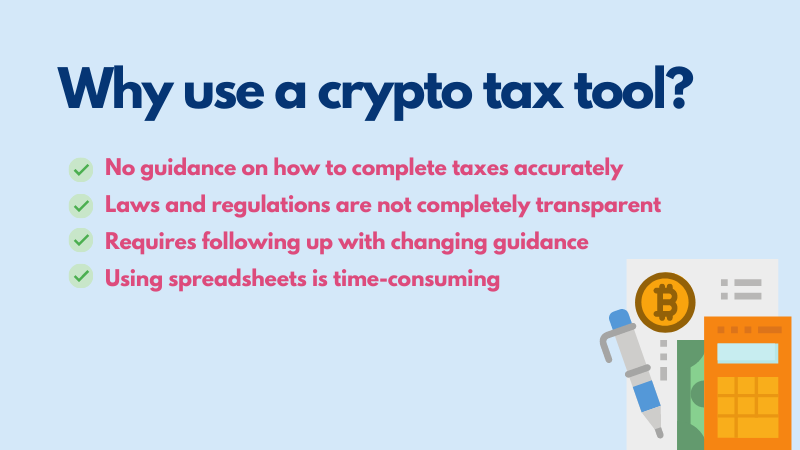
What to look for in a crypto tax tool
The basics
To start, make sure the crypto tax tool covers the needs of your clients. Does the tool accept the exact cryptocurrencies your clients trade, the exchanges they trade on, and the wallets they use? If a crypto tax tool doesn’t calculate transactions accurately, then the tax tool is essentially worthless.
Different tax tools accept different amounts of cryptocurrencies. So be sure to check.
Next, double-check the tax tool works in the country you are filing in (or your clients are filing in). If your client lives in Australia and the tax tool is not compliant with the Australian tax code, then the tax tool again, is worthless. While many crypto tax tools are compliant with multiple countries, most do not cover more than 20 countries (more on that later).
Now that we’ve gone over the basics, here are some of the nuances of a superior crypto tax tool.
Tax-loss harvesting
Crypto tax loss harvesting can help people pay less tax on their crypto investments.
It’s when experienced investors use the dips in the market to sell their assets at a loss, knowing they can offset them against their net capital gains. They may then choose to buy that same asset back for the lower price creating an artificial or paper loss.
To know when to sell - they need to track both their realized gains and losses and their unrealized losses and gains. They only have a realized gain or loss the moment they dispose of their crypto by selling, swapping, or spending it.
A good crypto tax tool will track their unrealized losses and their realized gains, so they can keep an eye on their taxable gains throughout the year and look for opportunities to create losses to offset them.
“Error reconciliation” function
There needs to be an “error reconciliation” function to ensure no transactions are missed. We recommend a double-entry ledger system so that every change in your asset balances is backed by an entry, making it easy to debug issues. Your tool should also highlight errors to show incorrectly imported or missing transactions. Without this, you might be taking more risk of audit.
Auto import verification
The tax tool should automatically check your wallet(s) to ensure all data has been imported correctly. Without this, you’d spend hours on end going through every transaction to make sure it is safely transferred to your tax tool.
Portfolio tracking
Does your crypto tax tool have portfolio tracking? We hope so. A portfolio tracker allows you to see your total holdings and portfolio growth over time across all your wallets and accounts. With a portfolio tracker, you see your total ROI from invested fiat, get an income overview, as well as an outline of your mining, staking, lending, and other crypto income. This gives you an accurate picture of how much your clients were up or down in the year.
Transaction Limits
Keep an eye out for a “transactions limit”. For an average accountant, we recommend having a limit of at least 100,000 transactions. Here’s why: a lot of clients who trade crypto will have thousands of little day-to-day transactions. If you plan to build a roster of high-paying crypto clients, these day-to-day transactions add up quickly. Many tax tools offer different packages, with different transaction limits. Some even allow you to purchase more transaction limits if you need to. Be aware of this before you pick a tool as you want plenty of bandwidth for your client's needs. This leads us perfectly to pricing.
Pricing
Some crypto tax tools will charge you money from the start, some won’t. It can be a bit of a risk to pay for something when you don’t know exactly what you’re getting. But often, the free trials do not provide the needed features. So what’s the best option?
We recommend you find a tool that offers a great rate on bulk pricing and is highly rated. This way you can test out the complete tool, with all of its features, without spending an arm and a leg. And in fact, a paid tool is actually better because it assures compliance.
Bonus Points
If the tax tool has a database history to ensure your costs are correct, you get bonus points. The database history acts as a safety net so that you know all prices are correct. This means you get an accurate tax report and reduce the risk of audits. By having the database history, you will always be protected because every transaction will be documented.
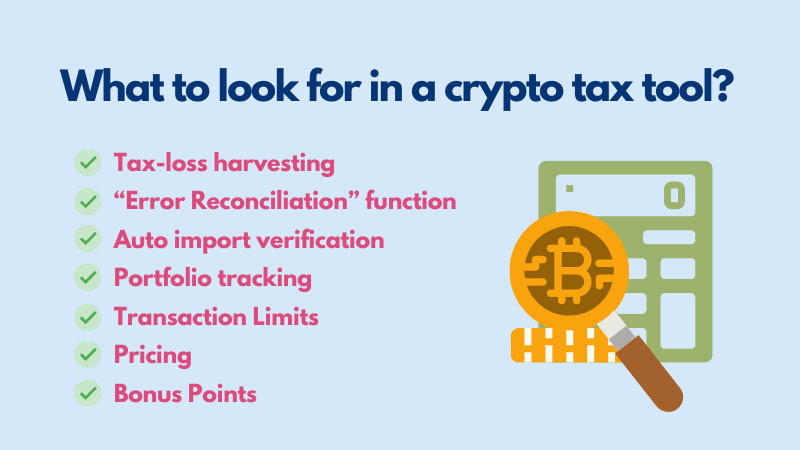
What to avoid in a crypto tax tool
Lack of tax report generation
Being audit-proof means having every crypto asset accounted for. If a tax tool does not have a tax report to clearly show your client’s crypto holdings, you could be taking on audit risk.
A crypto tax report is proof of all transactions and holdings which means you can double-check any transaction. It will also work out any necessary currency conversions for you - so that your client’s report makes sense for the country they’re filing in.
Missing data
Because there are many layers to crypto taxes i.e. currencies, wallets, exchanges, blockchains, and sometimes 1,000s of transactions, you need to find a tax tool that will import all data reliably and safely from the exchanges and wallets.
The best way to be reassured of reliable importing is through an Application Programming Interface or API. API allows the crypto tax tool to interact with another software application. This makes it so you can easily and safely upload data from exchanges.
No API
Why don’t all crypto tax tools have API? There could be a wide range of reasons for this. Some businesses are still new and growing. They will likely have API in the future but don’t have the capital to install it now. Others might be adding API. There’s no sure way to tell exactly. But since API is both safe and simple, not having it in a crypto tax tool can be a nightmare if you want to make crypto taxes as easy as possible.
Location Restrictions
If the tool doesn’t offer compliant services for your country or the country of your clients, it is worthless to your business. Without compliance, you cannot complete their taxes. We recommend finding a tool that has over 20+ countries so you have maximum flexibility in your business.
Limited compatibility
There's not much point in having a crypto tax calculator if it isn't compatible with the exchanges, wallets, or blockchains your clients use. Choosing a crypto tax tool that supports major exchanges, popular non-custodial wallets and a variety of blockchains (including support for DeFi protocols) ensures you can calculate your clients' transactions correctly.
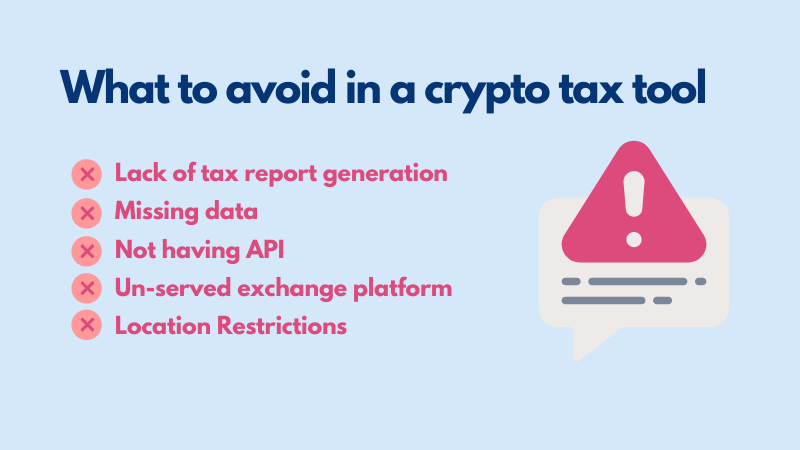
One more important detail: Security
We can’t forget that nothing above matters if the tax tool is not secure. Although most companies are doing their best to increase their security every day, it’s safe to double-check the tax tool is secure right now.
Encrypts all data while being transferred
API and application endpoints are TLS/SSL only
Scores an A+ rating on SSL Labs’ tests
Encrypts all data at rest
If your tax tool can check off these boxes, it is as safe as possible to use and protects all information to the max.
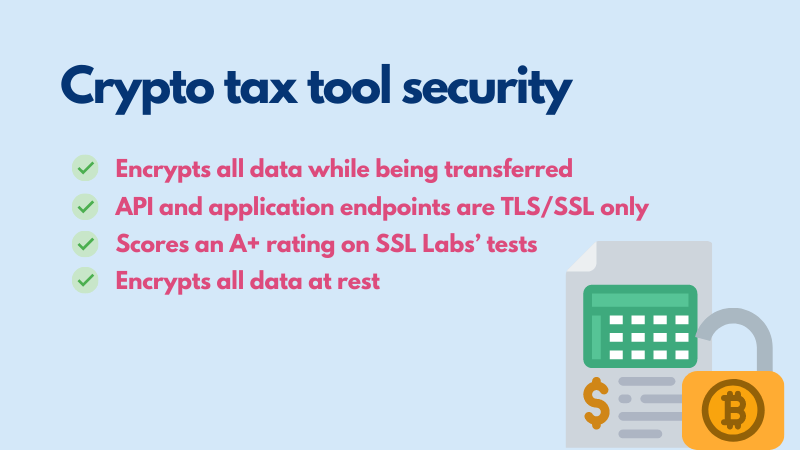
The ultimate crypto tax tool?
If you’re looking to increase your billable hours and charge more from crypto clients, Koinly makes crypto taxes as easy as they can be - while eliminating almost all risks of audits and protecting all of your data in the process.
Here’s why Koinly’s different...
Import from anywhere
Koinly securely auto-syncs data from all possible sources with API - no private keys needed. So you can connect your exchanges, wallets & blockchain addresses safely.
Import data from 600+ crypto exchanges
17,000+ cryptocurrencies
6+ years of prices in our database history
We offer historical crypto and fiat spot prices to ensure your client's conversions and costs are correct
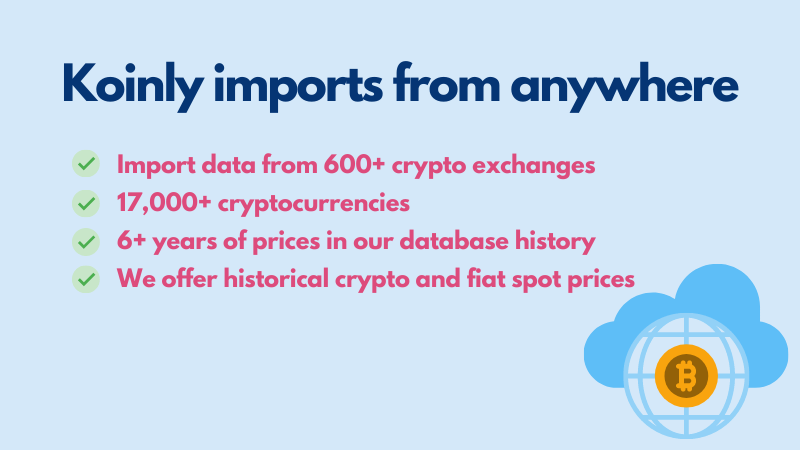 Tax reports that are compliant with local laws
Tax reports that are compliant with local laws
Koinly can help you generate your crypto tax reports - no matter where you live. From the US to Scandinavia to Japan and every country in between.
Koinly works with local crypto experts to create tax reports that are tax office compliant. Based on your client's home country selection, Koinly will tally and summarize crypto capital gains and losses in a way that abides by local tax rules and accounting methods, and in the currency of your choice.
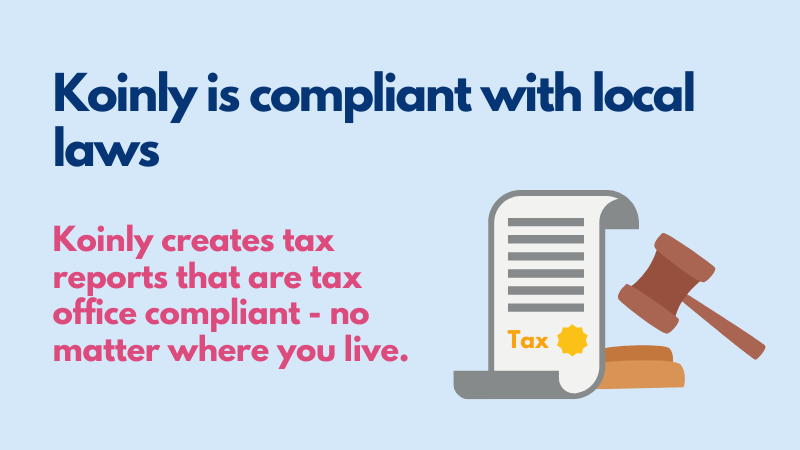 Easily find and fix issues with your transactions
Easily find and fix issues with your transactions
Say goodbye to missing trades, incorrect gains, and inaccurate tax reports. Koinly is packed with tools to help you find problems with your client's transactions, and fix errors fast. Koinly provides a 6+ year database history, generates a full tax report, and is known for its “error reconciliation” function so no transactions are missed.
Above all else, here are a few distinct features of Koinly:
Manage multiple clients from one account
ATO, IRS, CRA, and HMRC-compliant
Get tax reports in your client's local currency
Multiple cost-basis methods
Audit-proof reports - Koinly can generate all the forms you need to file your client's crypto taxes. Including the US Form 8949, Schedule D.
700+ reviews on Trustpilot
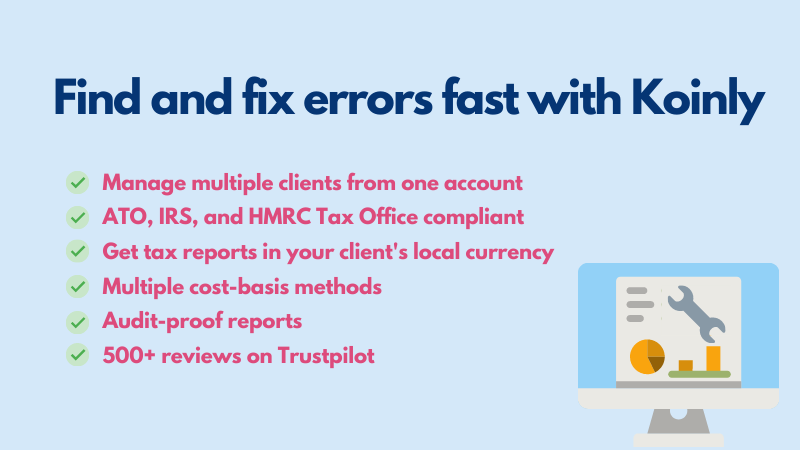 With Koinly, you save hours completing your clients' taxes and minimize any mistakes no matter how many transactions your clients made.
With Koinly, you save hours completing your clients' taxes and minimize any mistakes no matter how many transactions your clients made.
If you’re an accountant looking for a crypto tax tool that is fast, secure and reliable, you can get started with Koinly today.



